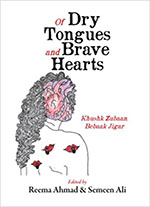The English word ‘dry’ doesn’t even begin to cover what the Urdu word ‘khushk’ conveys. Khushk pricks and chafes, like the continuous rubbing of sandpaper. There is bruising, never enough for the sort of attention that makes one rush to the Emergency Room, but bad enough to remain a painful slow burn. As a metaphor for unacknowledged damage, there couldn’t be a better term. This astounding volume, Of Dry Tongues and Brave Hearts: Khushk Zubaan, Bebaak Jigar, edited by Reema Ahmad and Semeen Ali, is a repertoire of deep, invisible hurts inflicted by patriarchy. By extension, making them visible by ripping apart the workings of the heart is a primary act of bravery.
The stark cover illustration is shorthand for what the reader can expect in the pages of the book. A woman, long flowing hair, a disembodied heart where the face should be, lips closed with locks inscribed on her body tell the story of restraint and desire, chains and freedoms. The anthology comprises poetry, fiction, essays and musings, photography and works of art by a new generation of writers and artists working on or around these themes broadly. It is no mean task to excavate the deepest emotions and thoughts, especially because they do not conform to any logic that the world may ask us to live by, and that can confound and liberate in equal measure. Some of the works published in the volume are blatant, others are cryptic. Yet, pouring oneself into the words is to experience life.
The editors’ brief is clear. The authors, poets and artists are to freely express themselves. So, Ahmad and Ali take the call to not edit the original works too heavily, to allow for imperfections, such that the authentic expression remains intact. This is not to imply poor production quality. Far from it. But that which chafes will necessarily remain raw, and keeping the wounds open by not improvizing on the aesthetic or structure or sometimes even grammar is the central appeal of this anthology. Ahmad’s Introduction is the anonymous woman, invisible and in the dark, raging as she does her chores, promising herself to never lose the use of her two favourite tools:

